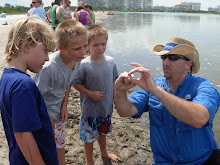A question that has and will be on the minds of many Gulf of Mexico residents is when will the Gulf completely recover from last year's Deepwater Horizon oil spill. Of course, there's not a simple answer to this question as there are many ecological, economic, and social factors that contribute to the outcome.
I was recently sent an interesting report entitled, "An expert opinion of when the Gulf of Mexico will return to pre-spill harvest status following the BP Deepwater Horizon MC 252 oil spill" which attempts to provide an initial repsonse to this omnious question. It is written by Dr. John W. Tunnel, Jr of the Harte Research Institute for Gulf of Mexico Studies at Texas A&M University – Corpus Christi. Of particular interest to me are the findings relating to the impact of the spill on the Gulf's fisheries.
Its important to note that even in the report it mentions, "As Dr. Wes Tunnell has noted in this opinion, establishing a recovery date or time is more difficult than determining the impact from the spill itself. In fact, establishing an exact recovery time is essentially impossible." To view the entire report click here.
Shrimp
In summary, if potential impact scenarios stated above have not significantly impact 2010 shrimp populations and their life cycles, it is believed that shrimp catches for the brown, white, and pink shrimp in the northern Gulf of Mexico will likely continue along the same harvest trends in recent years by 2011, and even more likely by 2012. Loss of Mississippi Delta nursery habitat could cause a percentage reduction in shrimp population size until marshes recover.
Crab
In summary, because blue crab populations do not appear to have been significantly impacted by the DWH oil spill, and because they are a highly reproductive species with widespread distribution throughout the region, it is believed that their population levels will likely continue along the same harvest trends in recent years in 2011. As noted above, some local populations may be reduced by larval impacts from the oil (or oil and dispersants) or by reduction in nursery ground coastal marshes. As indicated with shrimp, this loss of nursery habitat could cause a percentage reduction in crab population size until the marshes recover.
Oysters
In summary, it is believed that oysters in most areas of the northern Gulf will likely continue along the same harvest trends in recent years in 2011. In areas where oysters died as a result of freshwater diversion and flooding, oyster reefs should be recolonized by young oysters in 2011 (assuming there are no large scale flooding events in 2011), but they will not likely be of harvestable size until late 2012 or 2013. In areas where oyster reefs were heavily oiled, oyster reefs may not recover for 6-8, or even 10 years.
Finfish
In summary, commercial finfish are not believed to have been significantly impacted by the DWH oil spill, except with the possibility of those in the floating fish egg stage. If the fish eggs were negatively affected for certain species, then short-term, and possible long-term consequences, are likely for those species. If recruitment classes were normal in 2010, then, the fishery will likely continue along the same harvest trends in recent years during 2011.
Subscribe to:
Post Comments (Atom)





No comments:
Post a Comment